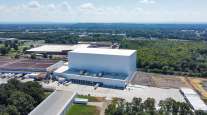Contributing Writer
Americold Sees Surge in Q1 Profits, Revenue

[Stay on top of transportation news: Get TTNews in your inbox.]
Refrigerated warehouse operator Americold Realty Trust saw revenue and profits jump in the first quarter as its storage and distribution network played a key role in supplying a surge in grocery demand in response to the coronavirus pandemic.
“Our first-quarter results show the effects of families stocking up on food to fill their freezers much like one would see in preparation for a big storm or hurricane,” Americold CEO Fred Boehler said in a conference call with analysts.
Business grew in two waves, first as an initial group of consumers rushed to supermarkets in mid-March and then as others fearing shortages did the same late in the month, he said.

Host Seth Clevenger speaks with Mike Perkins and Derrick Loo, test drivers at Peloton Technology, one of the companies at the forefront of developing truck platooning systems. Hear a snippet, above, and get the full program by going to RoadSigns.TTNews.com.
That business activity replaced the impact of reduced food consumption at restaurants, sporting events, schools and hotels as regions closed gathering places to combat the COVID-19 pandemic. But even then, Americold collected revenue from storing the unused food at its facilities, Boehler said.
The Atlanta-based company posted net income of $23.5 million in the quarter. That compared to a loss of $4.6 million in the same period a year earlier. Diluted earnings per share swung positive to 11 cents compared with a loss of 3 cents a year earlier.
Revenue jumped 23.1% to $484.1 million compared with $393.1 million in the first quarter of 2019.
Americold is the world’s largest publicly traded owner and operator of temperature-controlled warehouses. The company operated 172 warehouses in the first quarter, an increase from 144 in the same period a year earlier.
Revenue from warehouses open at least a year, an important financial measure for the company, rose 5% compared with the first quarter of 2019.
Americold has an additional 11 facilities operated under its third-party management business segment.
Although the pandemic has created a shift in Americold’s operations providing more service to the retail grocery channel and less to food services and restaurants, Boehler said the broader disruption should not have much of an effect on the company’s business.
“Typically the general supply of food is not meaningfully impacted by the macroeconomic climate, though individual food items may be,” Boehler said. “People are going to eat, but what they eat and where may change.”
About 76% of the company’s business is with food manufacturers, so whether the product goes to retailers or restaurants doesn’t make much difference as long as it is eventually consumed.
“We are agnostic as to whose truck we are putting it on,” Boehler said.
Even some of the shutdowns at meatpacking plants trying to contain the spread of the coronavirus would have at most a transient effect on Americold’s business, he said.
“People need protein. If pork or beef is not available they will shift to fish or chicken. We might see a minor hit to services in one plant, but we pick it up in another,” Boehler said.
The company expects the mix in business to start to shift back to food service establishments as regions and states lift shelter-in-place orders. However, Boehler said it is impossible to predict how consumers will react.
“Our diverse infrastructure is built to withstand shifts in food demand,” he said.
The company had liquidity of approximately $1.2 billion at the end of the quarter. That included $263 million in cash and available borrowing capacity on its revolving credit line.
Americold ranks No. 14 on the Transport Topics Top 50 list of largest logistics companies in North America.
Want more news? Listen to today's daily briefing:


